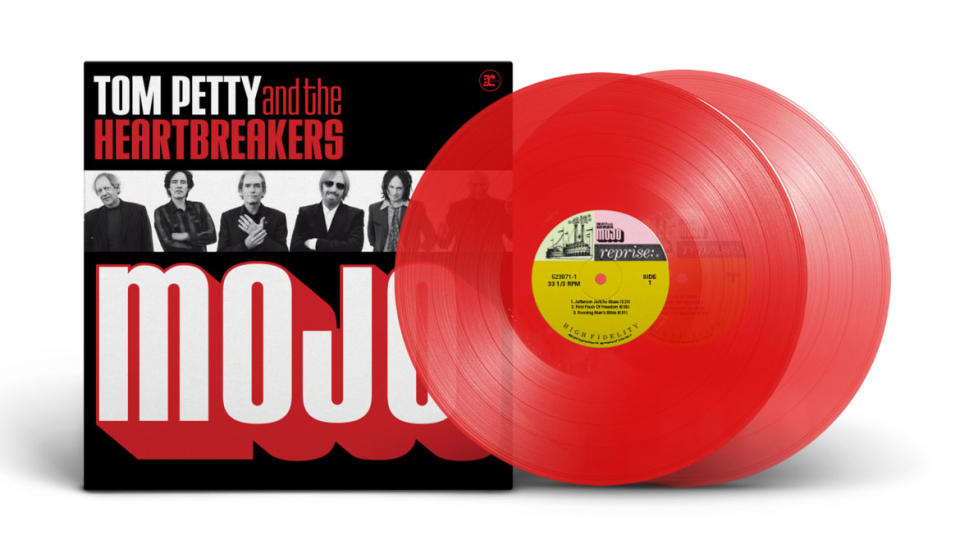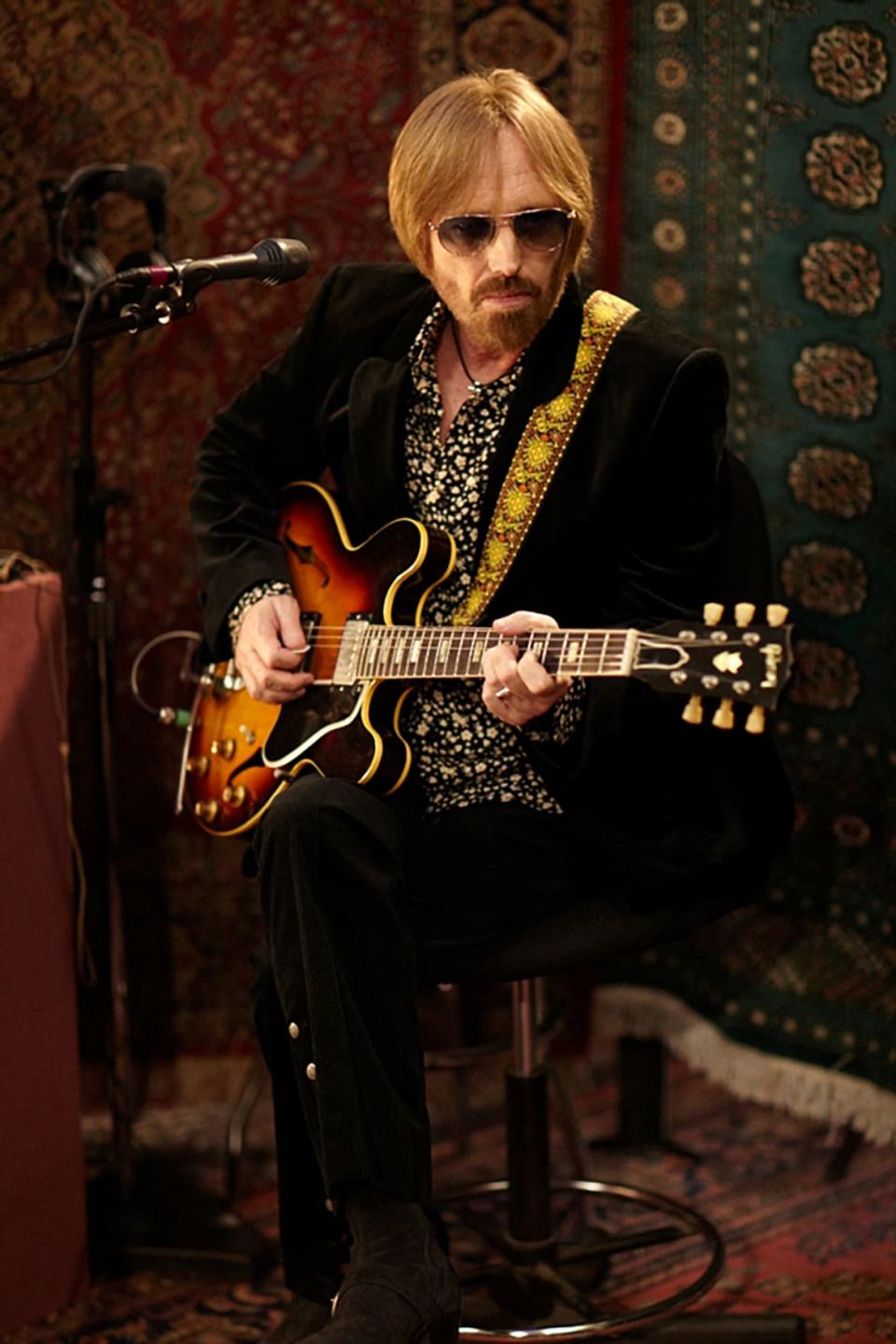Tom Petty Talks Getting His ‘Mojo’ Back in Lost Interview

- Oops!Something went wrong.Please try again later.
- Oops!Something went wrong.Please try again later.
On a balmy night in May 2010, I found myself sitting at the mixing board in the control room of Manhattan’s Germano Studios next to Tom Petty and his wife Dana, listening to Petty’s then-soon to be released album Mojo.
It was Petty’s first album with the Heartbreakers in eight years, and his excitement at hearing the results full-blast, on the studio’s world-class sound system, was palpable. He tapped his red Converse sneakers, he pulled on his electric cigarette; he was in a great mood.
Midway through this pinch-me moment, Mike Campbell, the Heartbreakers’ guitarist and the man Petty later described to me as his “co-captain” in the band, ripped out a truly spine-tingling riff. Petty bounced up and down in his chair. Then he turned to me, and, looking over his dark shades, unleashed that half-menacing, half-exuberant Florida chuckle of his.
“Man, that sounded fantastic,” Petty said, as the final notes of the album closer “Good Enough” faded into nothing. It certainly did. And soon, the room of family, friends, and assorted Heartbreakers broke out into backslaps and smiles.
After some chit-chat, I returned to my role as reporter.
“You must be real proud of this one,” I clumsily opened my conversation with Petty. But he wasn’t phased. With that trademark Southern deadpan, Petty grinned at me and, without hesitation, replied, “Shit yeah!”

Tom Petty & The Heartbreakers’ acclaimed 2010 album Mojo vinyl reissue.
Mojo, Tom Petty and the Heartbreakers’ first album together since 2002’s The Last DJ, was a corker, and helped remind anyone who’d forgotten that they were, quite simply, the best rock ‘n’ roll band in America. Now amazingly 13 years old, the album is being rereleased on Friday (on what would have been Petty’s 73rd birthday) as both a limited-edition double vinyl LP pressing and a digital-only, expanded “Extra Mojo Version.”
A creative left turn in 2010, Mojo is the band’s most blues-influenced record, featuring a hard-hitting collection of guitar-driven rock songs. Highlights include the hit “I Should Have Known It,” a driving rock track written by Petty and Campbell that became a live staple, fan-favorite track “Good Enough,” the bluesy first album single “First Flash of Freedom,” and “Something Good Coming.” The “Extra Mojo Version” also includes two previously unreleased tracks from the Mojo sessions: “Mystery of Love” and a cover of “Help Me” by blues great Sonny Boy Williamson II.
After speaking with Petty for about 15 minutes—about the new record, his Traveling Wilburys bandmates Roy Orbison, Bob Dylan, and George Harrison, and his frustration at having recently been forced to retire his beloved Gibson Hummingbird acoustic guitar, which he had written almost every Heartbreakers hit on—he ambled off to make the rounds with the 30 or so people lucky enough to be invited to this first public taste of Mojo. In the meantime, Dana Petty and I hatched a plan to try and convince her husband to perform the album start to finish, bookended by hits.
It wasn’t a crazy idea. At 65 minutes, Mojo is a good old-fashioned rock ‘n’ roll double album that begged to be played live. While the songs are not the perfect three-minute pop cuts Petty was always known for, the long, bluesy jams—built around old-fashioned story songs, played by one of the last great bands from an almost bygone era in rock music—feel like the perfect soundtrack for a big arena show.
“Tom was listening to a lot of old blues records, and Mike [Campbell] was listening to a lot of Zeppelin,” Heartbreakers keyboardist Benmont Tench told me later.
It shows. In fact, the era and sound that Mojo owes the most to is late-’60s London blues like the Peter Green-fronted version of Fleetwood Mac—that pre-Led Zeppelin moment in rock where American blues met tuneful British virtuoso playing. It’s a great style to draw inspiration from, and Petty and his Heartbreakers lived up to their lofty aspirations.
When Tom Petty Was at the Height of His Musical Powers
“I picked up a ’59 Les Paul,” Campbell told me later. “I got it mostly because I loved it. I didn’t know if I’d use it in the band that much. I brought it down one day, and Tom said that I should make an album around the guitar, and that became Mojo. So, we were leaning on that sound. In fact, there were a couple of times when Tom brought in a new song that I thought, ‘Let me use a Rickenbacker on this.’ But he wanted me to stay with the Les Paul.”
When he returned from making his rounds, Petty recalled of the Mojo studio sessions: “I didn’t come in with all the riffs worked out, except for in a few places where I knew what I wanted. In most cases I just came in and strummed an acoustic and played the songs to the band. We did four sessions of about 10 days each and just developed the songs in our rehearsal space live, right there on the floor [of the studio].”

“We always draw, this album included, from our experiences and inspirations,” Campbell recalled. “We still draw from those same places, people who inspired us when we were young. But we also draw from what we’ve already done, and we try not to repeat ourselves, too. As you go along, that gets to be a bit of a good problem to have.”
Mojo co-producer Ryan Ulyate later told me there were only “about 28 days of actual recording,” and that his approach to recording the album was “just like a live show.”
“Tom really felt he learned something from making the Mudcrutch album [the 2008 reunion album of Petty’s early-1970s band]. We all did,” Ulyate said. “And the Heartbreakers are so good, he wanted to capture that sound live. So that was my job—to put the band in a place that they were comfortable, and get that down.”
Recorded and mixed using the Heartbreakers’ live setup—and in an effort to capture the sound of the Clubhouse, Petty’s L.A. warehouse-turned-studio—Ulyate kept the band’s monitors and volume low and worked with their monitor engineer, the late Greg Looper, to send the signal via the same console he used for the band’s live monitors.
“It’s exactly the same setup we used to record the Gainesville show that came as a bonus DVD with the Runnin’ Down a Dream documentary DVD a few years ago,” Ulyate explained. “There was some bleed, but it wasn’t that hard to manage, and it actually added to the sound we were trying to capture. In fact, the band doesn’t actually play very loud. People would be surprised to find out how quietly Mike Campbell plays.”
While what first strikes you about Mojo is how great it sounds—it really seems as though you’re sitting in the middle of the band while it plays just for you—in the intervening years, it has become a full-fledged classic Tom Petty and the Heartbreakers record. Extended band workouts, like the instant classics “First Flash of Freedom,” “I Should Have Known It,” and “Good Enough,” sit alongside beautiful and moody melodic stunners like “Trip to Pirate’s Cove,” “No Reason To Cry,” and “Something Good Coming.”
“Mojo is a blues-based record,” Campbell said. “Or at least we’re kind of basing it on blues guitar. We’re not, per se, a blues band. We’re white guys from Florida. But we grew up listening to a lot of blues. On Mojo, we made a conscious effort to go into that bluesier well.”
But more than anything, throughout Mojo, the breadth of Petty’s songwriting and the playing of the Heartbreakers are on full display.
“I think we sound really energized, and I think we collaborated in a way that we might not have been able to before,” Campbell told me later. “I thought especially the singing sounded really young-ish. I told Tom that, and he got really happy about it.”
“I don’t think we could have made this record 15 or even 10 years ago,” Petty told me bluntly that night, clearly in agreement with Campbell. “We’ve always been a great band, but we’ve really blossomed in an unexpected way, and this album really showcases that. I’m really happy with this record. I always say that, but this time there’s something really special going on.”
Get the Daily Beast's biggest scoops and scandals delivered right to your inbox. Sign up now.
Stay informed and gain unlimited access to the Daily Beast's unmatched reporting. Subscribe now.

